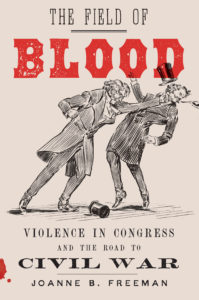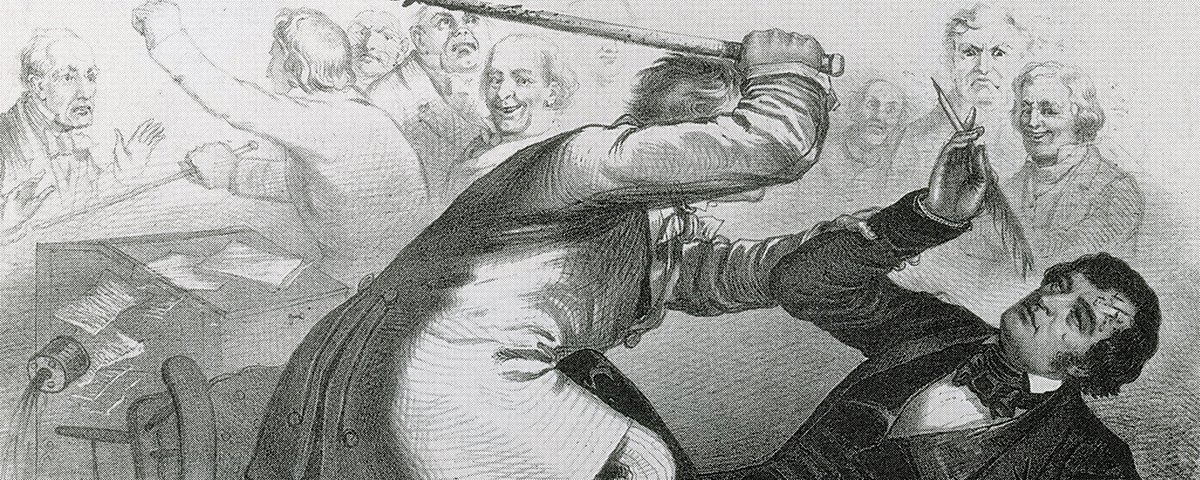Today’s polarization in Congress has nothing on its antebellum antecedent. In her new book, The Field of Blood: Violence in Congress and the Road to Civil War, Yale historian Joanne B. Freeman documents dozens of literal brawls involving congressmen and senators as the conflict over slavery reached a boil.
Members of Congress now insult each other regularly, but they don’t often fight. Before the Civil War, however, insults could lead to fisticuffs, and drawn knives and pistols. Why the difference? America was different, Washington was different, and Congress was different. Violence was

taken for granted in life and in politics, and Congress reflected the country. The atmosphere in the Capitol made matters worse; the building was hot, airless, and smelly, and representatives were sometimes drunk and often armed. Add the simmering problem of slavery, and you have a recipe for violence. Between 1830 and 1860 there were at least 70 physically violent incidents involving congressmen or senators, including one death by duel in 1838. Most of these fights, as well as countless near-misses, have been long lost to the historical record.
What caused this? At first, violence mainly centered on party politics, but slavery eventually fanned the flames. Southern congressmen saw opposition to slavery as an affront
to their personal and sectional honor, as well as a threat to their region’s economy. They responded as slaveholders were wont to do, using insults and threats to bully opponents. Northerners—already at a numerical disadvantage because of the Three-Fifths Compromise—were also at a cultural disadvantage; many of them considered man-to-man violence in Congress ungentlemanly and condemned dueling as barbaric.
How did Southern bullying resonate? At times, Southerners intimidated noncomba-
tants” into compliance or silence—even in committee meetings, which were closed to the press and public. Southerners sometimes forced Northern committee members to go along with official reports that gave the South some advantage. Intimidation also shaped debate on the House and Senate floors, where some Northerners opted to remain silent rather than risk being challenged to fight and called out as cowards if they refused.

You chronicle congressional violence in the prewar decades through an insider’s eyes. What makes House of Representatives clerk Benjamin Brown French a useful guide? One of my goals in writing The Field of Blood was to use feelings and emotions to offer new insights into the growing distrust between Northerners and Southerners that tore the nation apart. Benjamin Brown French was an ideal anchor for telling this story. As a House clerk and later the House clerk, French was constantly on the floor or at the speaker’s desk, copying and organizing records, tabulating votes and adjudicating points of order. He was always there, always watching, and over the course of the book he undergoes an amazing transformation. He starts out as a “doughface,” a term for a Northern Democrat who appeases Southerners on slavery to preserve the Union and promote his party. Liked by Whigs and Democrats, French gradually gravitates to the antislavery Republican Party and arms himself in self-defense, prepared to shoot Southerners if need be. Seeing the period through French’s eyes let me get at the emotional underpinnings of the story of the coming of the Civil War, and the reality of seeing one’s nation torn in two.
Southerners’ aggressive behavior backfired. Congressional debate over slavery became more heated and violent as westward expansion brought new states whose slavery status had to be determined. Beginning in the late 1840s, the telegraph and an increasingly independent press spread news of that violence throughout the nation with ever-increasing speed and reach. Northerners realized their representative rights in Congress were being trampled by a “Slave Power” that suppressed debate over slavery. For many, that sense of powerlessness had a more immediate impact than their feelings about slavery itself. They refused to be bullied any longer.
In 1856, on the Senate floor, South Carolina Representative Preston Brooks caned Massachusetts Senator Charles Sumner. On May 19-20, 1856, Sumner, a Northern abolitionist, made an incendiary antislavery speech. Brooks took Sumner’s remarks as insults to his state, his section, and a relative of his, South Carolina Senator Andrew Butler. On May 22, the outraged Brooks confronted Sumner at his Senate desk. Instead of challenging Sumner to a duel like a gentleman, Brooks beat him over the head until his cane shattered. It would be three years before Sumner returned to the Senate. Thanks to the telegraph, within hours people around the country learned of the attack, which had an intense emotional impact. After years of bullying and a spate of physical assaults by Southerners in Washington, Sumner’s beating outraged Northerners, inspiring some to urge their congressmen to fight.
Talk about three Northern senators’ pact to “fight to the coffin.” In 1858, antislavery Republican Senators Benjamin Wade of Ohio, Zachariah Chandler of Michigan, and Simon Cameron of Pennsylvania had had enough of Southern bullying. Outraged by insults and talk of “crushing” the Republican Party, the men signed a pact swearing to challenge Southern offenders to duels, and “fight to the coffin.” This was risky—not only physically, but because their constituents disapproved of dueling. The alternative—depriving their constituents of their full representative rights—was unendurable. I discovered this pact in a statement that they made, addressed to posterity, explaining their cause and their fight. Reading of their humiliation, their outrage, and their commitment to their principles brought tears to my eyes. Their powerful statement of purpose seemed to speak to me.
These days most politicians don’t carry weapons in Congress, but civility is in short supply. Will things get worse? There are indeed some similarities between the 1850s and the present. Our extreme polarization, splintering political parties, and the prevailing distrust in national institutions echoes the past in many ways. But I wouldn’t presume to predict the future. I would hope that our constitutional system of government would do what it’s supposed to do, and channel national divisions, rather than enflame them.





